No, they're not called "Xenomorphs"—at least, not with a capital "X."
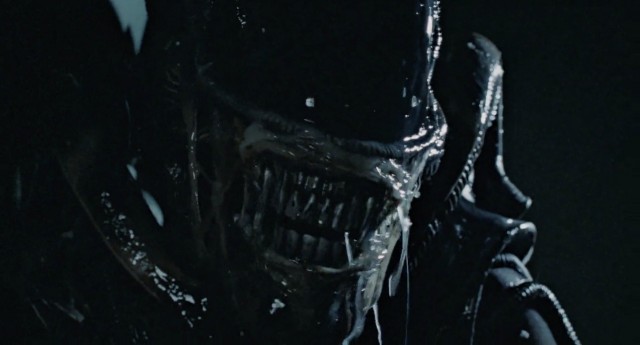
Enlarge / WHO WANTS KISSES
20th Century Fox
Welcome to The Multiverse, a new column where'll you'll find Ars'
explorations and meditations on the world of science fiction. The
Multiverse covers things we love, the things we hate, and the things we
do not yet understand from source materials new and old. Send questions,
tips, or just say hi to The Multiverse's writers at themultiverse@arstechnica.com.
Sigourneyexplorations and meditations on the world of science fiction. The
Multiverse covers things we love, the things we hate, and the things we
do not yet understand from source materials new and old. Send questions,
tips, or just say hi to The Multiverse's writers at themultiverse@arstechnica.com.
Weaver’s Ripley stands in front of the squad of ten cocky, poised space
marines. They laugh and joke, oozing bravado and testosterone—even the
women. As the shavetail lieutenant lays out the situation, Bill Paxton’s
mouthy PFC Hudson interrupts: "Is this going to be a stand-up fight,
sir, or another bug hunt?"
"All we know is that there’s still no contact with the colony,"
replies the lieutenant, Gorman, "and that a xenomorph may be involved."
"Excuse me, sir," interjects PFC Frost from the back row, "—a what?"
"A xenomorph," repeats Gorman, emphasizing the syllables. It's one of the few times in all four Alien series films where the creatures are referred to directly, rather than obliquely as "them" or "it."
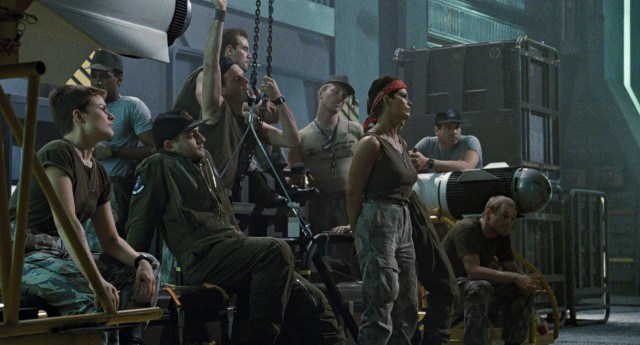
Enlarge Hudson has a question.
Of course, we in the audience know what’s waiting down on the planet below—the movie is called Aliens, after all. And as the sequel to Ridley Scott’s 1979 haunted house masterpiece Alien,
it was a film that was bound to be full of toothy, spiny, drooling
monsters. But Gorman’s casual arrogance at quickly reeling off a name
for the nameless terror that killed off Sigourney Weaver’s six (well,
five, really) shipmates fifty years before implied that this wasn’t the
squad’s first encounter with the titular bad guys, and that the
creatures were just another casual foe that could be defeated by a
combination of attitude and techno-toys. As you might expect, this
assumption proves to be completely wrong, and the "xenomorph" term has
been causing confusion ever since.

Enlarge Aliens
is among other things a Vietnam war allegory, pitting military
arrogance against the implacability of an enemy unshackled by
conventional definitions of combat. All the technology in the world,
even these giant guns, won't save our heroes. If they really are supposed to be our heroes.
is among other things a Vietnam war allegory, pitting military
arrogance against the implacability of an enemy unshackled by
conventional definitions of combat. All the technology in the world,
even these giant guns, won't save our heroes. If they really are supposed to be our heroes.
20th Century Fox
Bug hunts and bad guys
During the marines’ post-thaw breakfast in the Sulaco’scafeteria, PFCs Frost, Spunkmeyer, and Hudson joke about "Arcturian
poontang" (along with how it apparently doesn’t matter whether the
Arcturian with whom one is fooling around is male or female). And, of
course, the faceless Weyland-Yutani corporation pulling the strings is
clearly aware of life in the stars—after all, they diverted the Nostromo
in the first movie to LV-426 specifically to bring back a sample of the
alien life form which they already knew was there. And then there’s
that whole Prometheus movie.
But Weyland-Yutani keeps its secrets, and whatever revelations the company got out of the events in Alien
were suppressed, or at least held very, very closely. Even Carter
Burke, the unctuous Special Projects Director of Weyland-Yutani (Space)
Corp’s Special Services Division, appears skeptical of Ripley’s story
(though he believes it enough to send a team of wildcatters out to the
reported coordinates of the Engineer derelict, thereby causing the death
of all but one of the Hadley’s Hope colonists).
Hudson's question in the scene above about a "stand up fight" versus a
"bug hunt," implies he’s done both before and vastly prefers the
former. But the fact that Ripley’s character has been invited along as a
"consultant" and has to explain the aliens to the squad is proof enough
that they’ve never run into the things before—as is the total collapse
of discipline and unit effectiveness that the squad undergoes when their
encounter does turn into a firefight.
The corridors of Hadley’s Hope are littered with craters and holes
from acid, but they’re attributed to "Ripley’s bad guys" instead of any
kind of formally named foe. When the squad encounters captive
facehuggers in the colony’s medical lab, even Burke has to ask if these
are indeed the aliens Ripley briefed them on. And that is all consistent
with Weyland-Yutani's information suppression in the Alien universe.
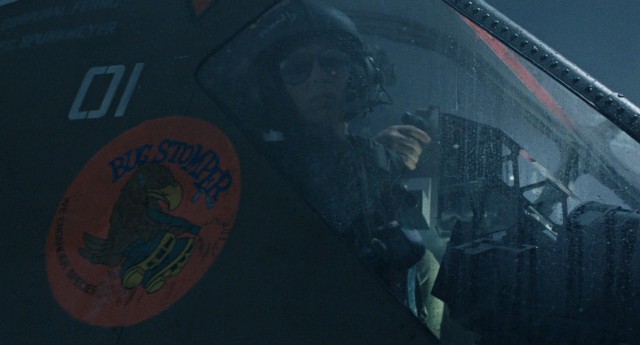
Enlarge "Bug Stomper" nose art on the first of the Sulaco's two UD-4 Cheyenne gunships.
20th Century Fox

20th Century Fox
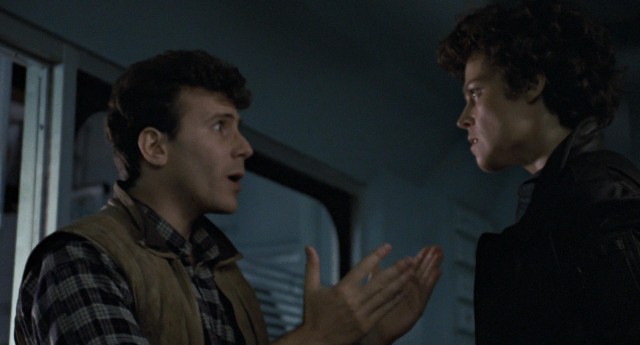
Enlarge Burke demonstrates poor judgment.
20th Century Fox
Why, then, does Hudson ask if the mission is a "bug hunt?" Though
it’s never clarified on-screen in a canonical fashion, it’s likely that
the Colonial Marines are indeed called upon to perform sweep-and-clear
operations without clear objectives. It’s also possible that "bug hunt"
is a play on "snipe hunt," a term that can be used to describe a purposeless task.
Also supporting the usage of "bugs" as a generic colloquialism for
all extraterrestrial life, there’s the much-ballyhooed "quarantine,"
mentioned multiple times in both the first and second movie. For
example, in Alien, Ripley doesn’t seem terribly surprised that
"an organism" has attached itself to her crewmate’s face-she’s far more
concerned with keeping it off the ship. "If we let it in, the ship could
be infected," she admonishes. "You know the quarantine procedure:
twenty-four hours for decontamination!"
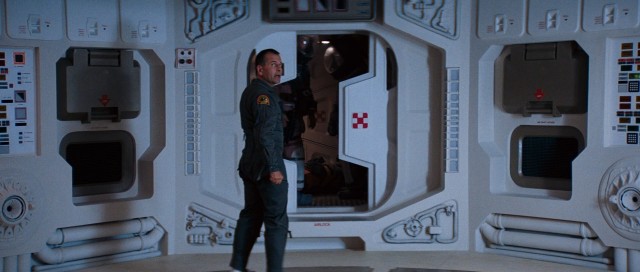
Enlarge In the first movie, company mole (and android) Ash is responsible for allowing the alien onto the Nostromo.
20th Century Fox
The "quarantine" gets another couple of mentions in Aliens,
or at least something similar. Ripley refers to it as the "ICC
quarantine," and we know from Burke’s dialog in the Special Edition of
the movie that ICC is the initialism for the Interstellar Commerce
Commission (a futuristic spin on today’s Interstate Commerce Commission),
some form of future regulatory body. The ICC has strict controls on
biological items moving around in human space—we know this from later in
Aliens, when Ripley explains to the Marines that Burke planned
to stuff alien babies inside her and Newt in order to "get an alien
back through quarantine."
If we expand our view to include extracanonical sources like the Colonial Marines Technical Manual, we can find tons of additional support that extraterrestrial life (sentient and otherwise) is common in the Aliens universe. And, as before, most of those sources also agree that calling the aliens bugs is just a common figure of speech.
Xenomorphs—big "X" or little "x"?
Then there’s Gorman’s "xenomorph" comment. The way Gorman rattles offthe term makes it sound like he knows what he’s talking about, but
unfolding events make it clear he’s as clueless as the rest of them
about the nature of the creatures.
Writer and director Cameron takes pains to set Gorman up as the
embodiment of Vietnam-era military officer hubris and jargon-veiled
incompetence, and the lieutenant holds himself above and entirely
separate from the squad under his command. Dropping a fancy college word
like "xenomorph" is just another way to lord rank and position over the
jarheads—people whose names he hasn’t even really bothered to learn.
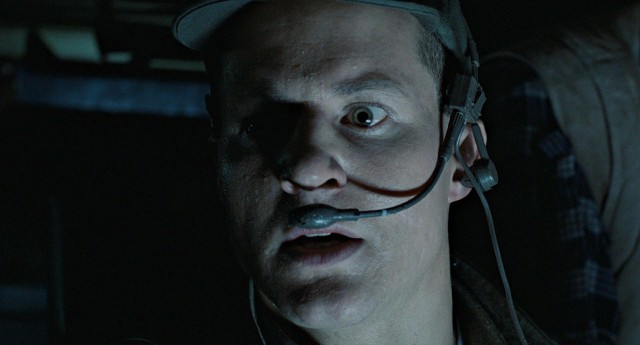
Enlarge I guess just because you've done 38 simulated drops doesn't really mean you're ready for command.
20th Century Fox
The word itself is a Greek construct. It combines the prefix xeno, meaning "foreign" or "strange," with the suffix morph, which means a shape or form with the prefix’s supplied attributes. The word xenomorph in this context is a generic term for any "strange or foreign form"—any alien life form.
What Gorman is saying isn’t "There’s a specific type of creature
called 'Xenomorphs' down there!" Instead, he’s saying "there are
non-human lifeforms down there." Any other interpretation is easily
disproved in the same scene, when Ripley is prompted to
describe the aliens. If the creatures have an official name that even a
corporal like Hicks knows, why in the world is Ripley there as an
advisor?
The use of "Xenomorphs" as a proper noun used to describe the series’
aliens is blatantly wrong. If you’re guilty of doing it, stop.
"Xenomorph" is just a fancy word for "alien," not the proper name of the
creatures.
What’s in a name?
And that, of course, leaves us with a bit of a vacuum—what are the aliens called?Ripley simply uses the word "alien" in the second movie, and
impersonal pronouns are employed more often than anything else ("they,"
"them," or "it"). No truly canonical source actually spells out anything
resembling an official name. However, the various DVD and BluRay
releases of the movies have assigned the fictional binomial name Internecivus raptus, or "murderous thief." If you’re willing to brave the dreck and sludge of the myriad Aliens comic books (including such literary gems as Aliens versus Predator versus The Terminator), you’ll also stumble across Linguafoeda acheronsis, or "foul tongue of Acheron."
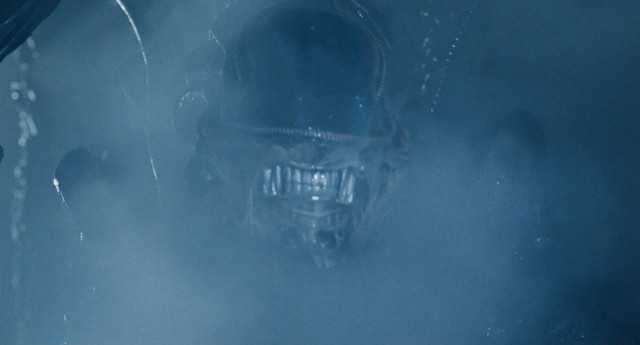
Enlarge Foul tongue, murderous thief—these guys just get called all kinds of names.
20th Century Fox
Linguafoeda acheronsis fits the required formula better than Internecivus raptus, but neither is really a good example of authentic binomial nomenclature, which has strict rules for how names are derived. The implication behind both is that the aliens are either of genus Linguafoeda or genus Internecivus, and of species acheronsis or raptus. Both names sound cool, and they have cool English translations, but both fail as instruments of classification or taxonomy.
Additionally—and this is a pretty deep rabbit hole, so I’ll only
mention it without dropping down into it—there is circumstantial
evidence within the movies that during their gestation phase, the aliens
can incorporate characteristics or traits from their hosts. This is
ostensibly a mechanism to ensure that the alien when it emerges is
better equipped to survive in whatever environment the host inhabits,
but it raises the complex question of how such an organism would be
classified. If a typical population of aliens includes aliens sprung
from different hosts, are they all the same type of organism?
For a wonderful in-depth discussion of this and many other aspects of Aliens semicanonical lore, fan site The Anchorpoint Essays is a great place to spend a few hours reading. The site appears to be offline, but the Wayback Machine has it archived.
Regardless of the problems of alien taxonomy and phylogeny, it’s all ultimately irrelevant—neither Internecivus raptus or Linguafoeda acheronsis have appeared on-screen within the mainline Aliens movies, and so neither are canonical.
The aliens’ "real" name remains officially unspoken. However, we do know for absolute certainty that they’re not named "Xenomorphs."
Special thanks to Ars forum member Mindsetter for the higher-quality images!
No comments:
Post a Comment